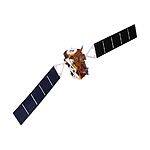Sentinel-1B
 Model of a Sentinel-1 satellite (with radar antenna missing) | |
| Mission type | Earth observation |
|---|---|
| Operator | ESA |
| COSPAR ID | 2016-025A |
| SATCAT no. | 41456 |
| Website | Sentinel-1 (ESA) |
| Mission duration | Planned: 7 years[1] Elasped: 6 years, 3 months, 9 days[2] |
| Spacecraft properties | |
| Spacecraft type | Sentinel-1 |
| Bus | Prima[3] |
| Manufacturer | Thales Alenia Space Airbus Defence and Space[1] |
| Launch mass | 2,164 kg (4,771 lb) |
| Start of mission | |
| Launch date | 25 April 2016, 21:02 UTC[4] |
| Rocket | Soyuz-STA/Fregat-M[5] |
| Launch site | Kourou ELS[5] |
| Contractor | Arianespace |
| Orbital parameters | |
| Reference system | Geocentric |
| Regime | Low Earth |
| Altitude | 693 km[6] |
Sentinel-1B was a European radar imaging satellite launched on 25 April 2016. It is the second of two original satellites in the Sentinel-1 constellation, part of the European Union's Copernicus programme on Earth observation. The satellite carries a C-SAR sensor, capable of providing high-resolution imagery regardless of weather conditions.
The satellite made its first observation on 28 April 2016, capturing a 250 kilometres (160 mi) wide image of the Austfonna glacier on Svalbard.[7]
Beginning on December 23, 2021, the spacecraft experienced an anomaly which resulted in a loss of data transmission. On January 10, 2022, the European Space Agency confirmed online that a power issue was the root cause of the issue and that initial attempts to fix it had failed. The agency confirmed that efforts to restore the spacecraft's capabilities would continue,[8] before announcing on 3 August 2022 that efforts to recover the mission would end. The power issue disabled the use of the satellite's payload, but otherwise the satellite remains operable, thus allowing ESA to perform a controlled deorbit. Sentinel-1B's deorbit is expected to take place once its successor satellite, Sentinel-1C is in orbit.[9]
See also
[edit]References
[edit]- ^ a b "Facts and figures / Sentinel-1". ESA. Retrieved 28 April 2016.
- ^ "End of mission of the Copernicus Sentinel-1B satellite". ESA. Archived from the original on 31 August 2022. Retrieved 28 May 2023.
- ^ "Thales Alenia Space flies high at the Space Symposium". Thales Group. 13 April 2015. Retrieved 28 April 2016.
- ^ "Sentinel-1B liftoff delayed another 24 hours". ESA. 23 April 2016. Retrieved 28 April 2016.
- ^ a b "Sentinel 1A, 1B, 1C, 1D". Gunter's Space Page. Retrieved 28 April 2016.
- ^ "ESA - Sentinel-1". Retrieved 18 January 2022.
- ^ "Sentinel-1B delivers". ESA. 28 April 2016. Retrieved 28 April 2016.
- ^ "Copernicus Sentinel 1-B Anomaly". Copernicus Open Access Hub. 10 January 2022. Retrieved 10 January 2022.
- ^ "Mission ends for Copernicus Sentinel-1B satellite". ESA. 3 August 2022. Retrieved 3 August 2022.

